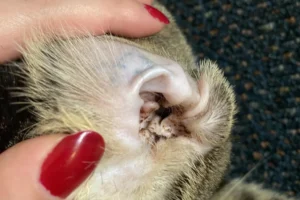Ear mites in cats can be a persistent and frustrating issue for pet owners. Despite trying various treatments, it may feel like these pesky parasites just won’t go away. If you’re wondering, “Why won’t my cat’s ear mites go away?” you’re not alone. In this blog post, we’ll explore the reasons behind this problem and provide actionable solutions to help your feline friend find relief.
The main reason why your cat’s ear mites won’t go away is that the treatment may not have been done correctly or for a long enough duration. It’s crucial to follow the vet’s instructions precisely to ensure the mites are fully eradicated.
Understanding Ear Mites and Their Lifecycle
If you’re wondering why your cat’s ear mites seem to linger despite your best efforts, it might be helpful to understand their lifecycle. Ear mites are tiny parasites that thrive in the warm, dark environment of your cat’s ear canal. They feed on skin oils and wax, causing irritation and discomfort to your feline friend.
These pesky critters have a life cycle that involves four stages: egg, larva, nymph, and adult. The entire life cycle can take as little as three weeks, so it’s crucial to be diligent in your treatment efforts to effectively break the cycle and get rid of the ear mites for good.
One key reason why ear mites can be challenging to eliminate is because they can easily spread from one pet to another. If you have multiple furry companions, it’s essential to treat all of them to prevent reinfestation. Additionally, ear mites are incredibly resilient and can survive in the environment for several weeks, making it crucial to not only treat your pets but also clean their bedding and living areas regularly.
For more detailed information on the lifecycle of ear mites and how to effectively combat them, check out this resource from the American Veterinary Medical Association.
Proper Treatment Techniques
When it comes to treating ear mites in cats, it’s essential to use the right methods and products to ensure success. One of the most common treatment options is ear drops prescribed by your veterinarian, which typically contain medications to kill the mites and soothe the irritation in your cat’s ears.
In addition to medication, proper cleaning routines play a vital role in eradicating ear mites. Gently clean your cat’s ears with a veterinarian-approved ear cleaning solution to remove debris and excess wax, creating an environment that is less hospitable for mites to thrive. Be sure to follow your vet’s instructions carefully to avoid causing further discomfort to your furry friend.
Regular and thorough treatment is key to completely getting rid of ear mites. Remember, patience is essential, as treating ear mites can take time and consistent effort. By following the correct treatment techniques and being diligent in your efforts, you can help your cat finally find relief from those pesky ear mites.
Environmental Considerations
If you’re wondering why those pesky ear mites keep coming back to torment your feline friend, it might be time to take a look around your living space. These tiny parasites can lurk in bedding, carpets, and even other pets, just waiting for the perfect moment to reinfect your cat. To prevent reinfestation, make sure to regularly clean and vacuum your home, wash your cat’s bedding frequently, and treat all pets in the household for ear mites to break the cycle. By creating a clean and mite-free environment, you can give your cat the fighting chance they need to finally get rid of those irritating ear mites for good.
Identifying Underlying Health Issues
While dealing with ear mites, it’s essential to consider that there could be underlying health issues preventing your furry companion from finding relief. Conditions like allergies, weakened immune systems, or skin infections can make it harder for your cat to shake off those persistent ear mites. Keep a close eye on your cat’s overall health, and if you notice any concerning symptoms, such as excessive scratching, head shaking, or foul-smelling discharge from the ears, it’s crucial to consult with your veterinarian. Identifying and addressing any health issues early on can make a significant difference in effectively treating and preventing ear mites in the future.
Additional Unique Insight: One crucial aspect to consider is your cat’s stress levels. Stress can weaken your cat’s immune system, making it harder for them to fight off ear mites. By providing a calm and comforting environment for your cat, you can help boost their overall health and resilience against these persistent parasites. Stress reduction techniques, such as engaging playtime, cozy hiding spots, and soothing music, can go a long way in supporting your cat’s well-being and aiding in the elimination of ear mites.
Remember, a combination of environmental management, regular vet check-ups, and stress reduction can play a significant role in helping your cat say goodbye to those stubborn ear mites once and for all.
Home Remedies vs. Veterinary Treatment
Dealing with your cat’s stubborn ear mites can be frustrating, but it’s essential to weigh your options carefully. While home remedies may seem convenient and cost-effective, they may not always provide the most effective solution. On the other hand, professional veterinary treatment ensures expert care and access to medications specifically designed to tackle ear mites effectively.
If you opt for home remedies, like vinegar or mineral oil, keep in mind that they may offer temporary relief but not eradicate the mites completely. It’s crucial to understand that untreated ear mites can lead to secondary infections and further discomfort for your furry friend. On the contrary, a visit to the vet guarantees accurate diagnosis and tailored treatment plan to address the issue at its core.
When it comes down to it, the choice between home remedies and veterinary treatment boils down to the well-being of your cat. While home remedies may work in some cases, seeking professional help ensures a more thorough and lasting solution for your cat’s ear mite problem. Remember, your pet’s health should always come first.
Extra Tip: Consult your vet before trying any home remedies to ensure they are safe and appropriate for your cat’s specific situation.
Monitoring and Prevention
After successfully treating your cat’s ear mites, it’s crucial to implement measures to prevent a recurrence. Regular monitoring of your cat’s ears for signs of mites, such as excessive scratching or dark debris, can help catch any issues early on. Additionally, incorporating preventive measures, such as routine ear cleanings with vet-approved solutions, can help keep ear mites at bay.
Tips for Prevention:
– Clean your cat’s ears regularly with a vet-recommended ear cleaning solution.
– Keep your cat’s living area clean and free from excess debris.
– Monitor your cat’s behavior for any signs of discomfort or irritation in the ears.
By staying proactive and vigilant, you can help minimize the risk of ear mites returning and ensure your cat stays healthy and happy. Remember, prevention is key to maintaining your pet’s overall well-being.
For more information on preventing ear mites in cats, visit Cats Protection for additional resources.
Consultation with a Veterinarian
If those pesky ear mites just won’t go away no matter what you try, it might be time to bring in the big guns – your friendly neighborhood veterinarian! Vets have the expertise and tools needed to treat ear mites effectively, giving your furry friend some much-needed relief.
When you visit the vet, they can conduct a thorough examination of your cat’s ears to confirm the presence of ear mites. Based on their diagnosis, they can provide tailored treatment options that may include medicated ear drops or oral medications to kick those mites to the curb.
Additionally, your vet can offer guidance on preventive measures to keep those ear mites from making a comeback. Don’t hesitate to schedule a consultation with your vet if you’re struggling to get rid of those persistent ear mites once and for all.
Fun Fact: Cats with ear mites may shake their heads or scratch their ears excessively as a way to relieve itching caused by the mites.
Have you noticed your feline friend doing the ear-shaking boogie or scratching their ears like they’re playing a never-ending game of scratch and itch? It might not just be for show – it could be a sign that those sneaky ear mites are causing some serious discomfort for your kitty.
When ear mites infest your cat’s ears, they can irritate the ear canal, leading to intense itching and discomfort for your furry friend. So next time you catch your cat busting out some excessive head shakes or ear scratching, it might be time to check those ears for mites. Remember, early detection and treatment are key to keeping your cat happy and healthy.
Alex, a passionate animal lover, has experience in training and understanding animal behavior. As a proud pet parent to two dogs and three cats, he founded AnimalReport.net to share insights from animal experts and expand his knowledge of the animal kingdom.




